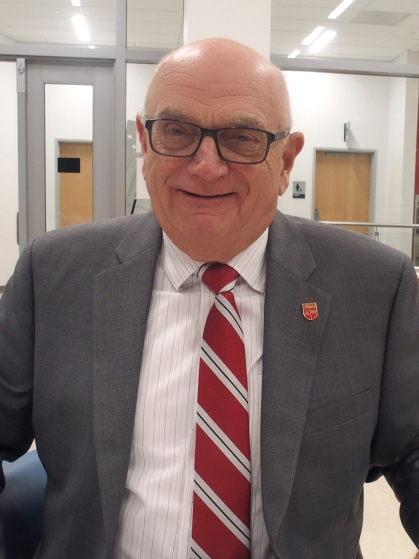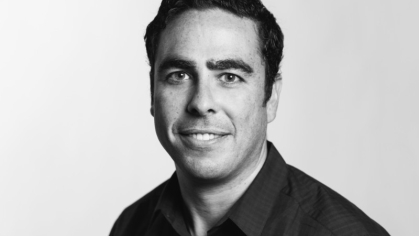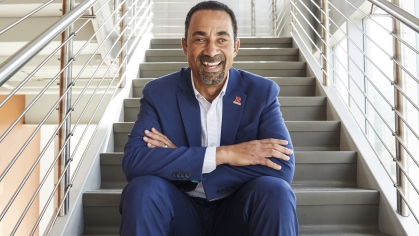“Rutgers is one of the best engineering schools in the U.S., but the cost of education there is comparatively low – far less than its value. Don’t mess up!” -- Ken Johnson

After receiving his B.S. in mechanical engineering in 1966, Ken Johnson entered the burgeoning U.S. aerospace industry, where he helped lead the development of critical spaceflight technologies at Lockheed Martin Space. By the time he retired as a vice president and general manager in 2001, he had been responsible for the design and functionality of hundreds of satellites – including most of the weather satellites used to monitor the global climate – spacecraft, and subsystems for space missions. A member of the Rutgers University Board of Trustees since 2016, he has served as philanthropy task force chair. Together with his wife Jackie, he has created and endowed a scholarship for students in the SoE Department of Mechanical and Aerospace Engineering. He has been instrumental in the recent introduction of Rutgers Engineering Alumni (REA), a reinvigorated alumni group for all 30,000 SoE graduates. A 2024 School of Engineering Medal of Excellence recipient of the Dean's Award for Service and Lifetime Achievement, he is also 2022 Rutgers Hall of Distinguished Alumni inductee and a 2013 Distinguished Engineering Alumnus.
Why Rutgers?
I chose Rutgers because its reputation and buzz about it while in high school, and for the strength of the School of Engineering. My interests migrated to mechanical engineering after I got there.
Why is it so important to you to stay connected with Rutgers?
You get much more than you give. I get a lot of satisfaction helping students, strategizing the future with the administration, and bringing my skill set to benefit both the university and the School of Engineering.
You had an impressive career at Lockheed Martin Space. What did you most enjoy during your time there?
I had a great ride from early in the U.S. space program to the broad and technically outstanding company it is today.
I had a wonderful career in all aspects of this enterprise – designing, developing, producing, and supporting space systems for our customers – beginning as an engineering college recruit and ending as a vice president and general manager.
How would you describe your leadership style?
All work is done in teams now, so it’s about motivating teams and building consensus with leadership. I use top-down and directive styles, but buy-in and individual commitment is best at developing consensus.
What were your proudest accomplishments in terms of the U.S. space program?
I’m proud to have been named a “Pioneer in Space” by the Smithsonian Air & Space Museum and receiving the NASA Public Service Award for its Dynamics Explorer program. I’m also proud to have been able to watch the launches of my satellites.
Would you have liked to be an astronaut?
No! But one of my staff did and flew on the Space Shuttle.
What do you most value about your Rutgers education?
Big picture skills, problem-solving skills, a very strong technical foundation, and a starting point professional network.
What advice would you have for entering students?
Rutgers is one of the best engineering schools in the U.S., but the cost of education there is comparatively low – far less than its value.
Why do you believe so strongly in the new REA?
It’s super important. Your whole life starts now, while in school, as a new graduate, as a young engineer – forever. A strong alumni network will help you – and you’ll help your fellow School of Engineering alumni.
What is most exciting about REA?
It’s an integrated part of the School that’s offering lifetime engagement for all alumni, as well as many planned collaborative activities with the School.
What did you do for fun as a student?
LOL – I was an engineering student. Who has time? Seriously, I enjoyed the bowling league, sportscar club rallies, tinkering with my car, football and basketball games, a campus lectures and concerts, and my senior design project on eliminating pollution from an internal combustion engine. I loved the grease trucks, the original Tumulty’s, and playing music in a rock band.
What do you do for fun these days?
I sailed up until a few years ago and enjoy music, woodworking, and volunteering for climate change initiatives.
If you were to go on vacation tomorrow, where would you go?
I’ve been to many countries around the Mediterranean and have sailed in the Caribbean, so I think I’d probably visit U.S. parks, the Pacific Northwest, or parts of California and Nevada.


